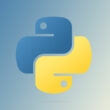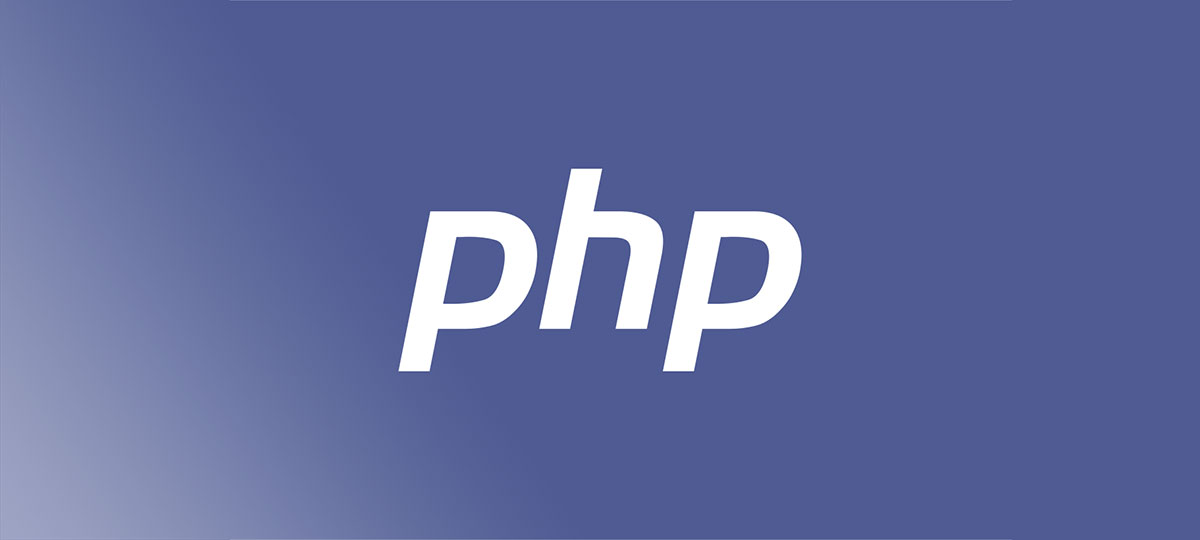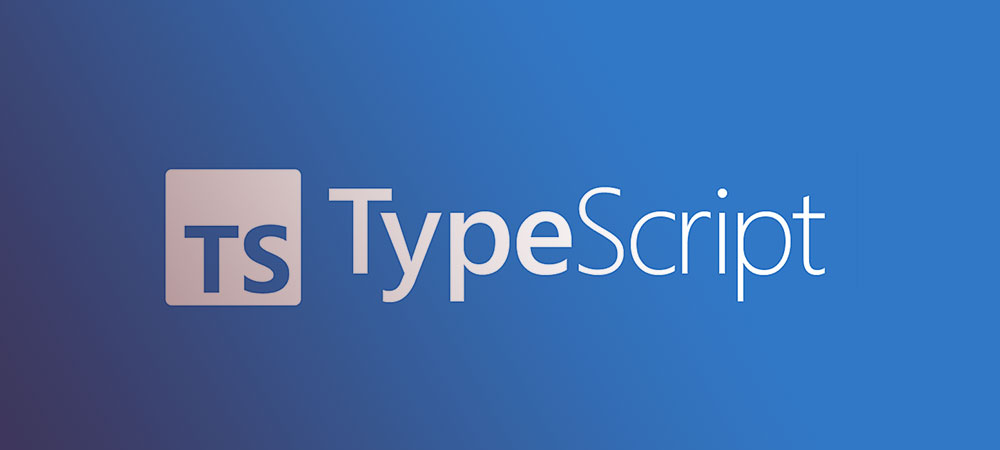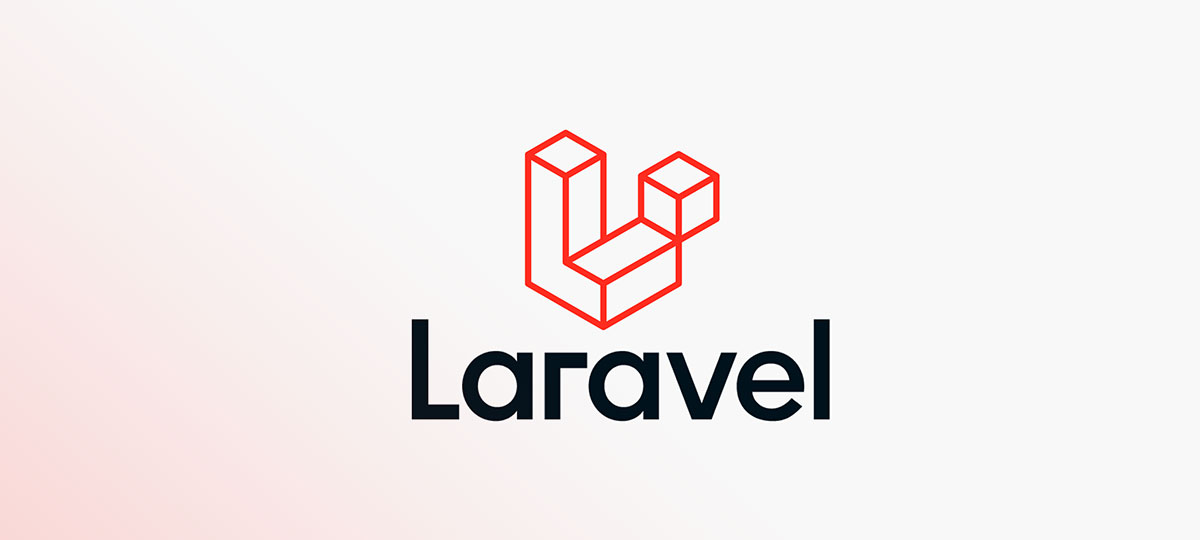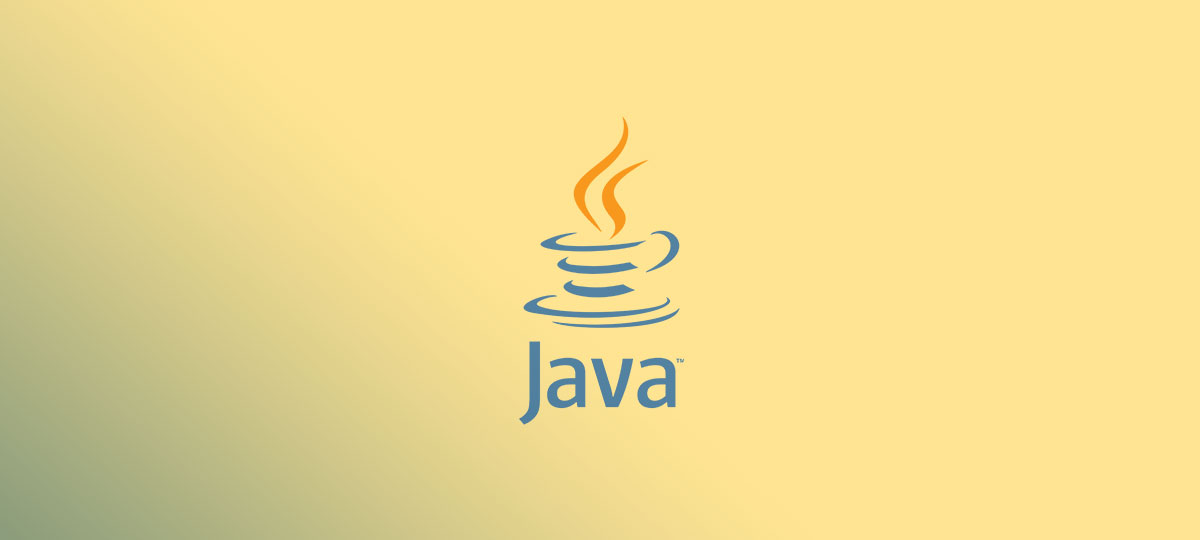In a digital landscape where the right tool can make or break your web presence, venturing beyond the familiar terrain of PHP can feel like leaping into the unknown.
But here’s the kicker: the world of web development is bristling with robust PHP alternatives that could be the game-changer your project needs.
Ever felt that itch for something that meshes with your unique vision just so, or scales effortlessly as your users multiply? That’s where this deep dive into the server-side scripting universe comes in handy.
By the end of our escapade, you’ll not only have mapped the contours of languages like Python, Ruby on Rails, and event-driven platforms like Node.js, but also frameworks that add wings to your coding feats—think Express.js or the mighty Angular.
Ready for the grand tour? We’ll zoom through modern web development frameworks, introduce you to the sleek world of Full-stack development, and even take a peek into serverless wonders like AWS Lambda. Buckle up, we’re all about the ride into tomorrow’s code!
PHP alternatives
| PHP Alternatives | Paradigm | Typing | Use Cases | Performance |
|---|---|---|---|---|
| Python | Multi-paradigm: OOP, procedural, functional | Dynamic | Web development, scripting, data analysis, AI/ML, scientific computing | Generally slower than compiled languages |
| Ruby | Multi-paradigm: OOP, imperative, functional | Dynamic | Web development (Ruby on Rails), scripting, prototyping | Slower than languages like Go or Java |
| JavaScript | Multi-paradigm: OOP, functional, imperative | Dynamic (TypeScript adds static types) | Web development (frontend/backend), serverless computing, desktop & mobile apps | High performance with JIT compilation in engines like V8 |
| Go (Golang) | Procedural, concurrent | Static | Cloud services, server-side applications, distributed systems | High performance due to native compilation |
| Elixir | Functional, concurrent | Dynamic | Web applications, real-time systems, distributed systems | Good for concurrency-intensive operations |
| Rust | Multi-paradigm: imperative, functional, concurrent | Static | Systems programming, embedded systems, web assembly, performance-critical applications | High performance, similar to C/C++ |
| Kotlin | Object-oriented, functional | Static | Android apps, web applications, server-side development | Generally good, compiles to JVM bytecode or native code |
| Swift | Multi-paradigm: OOP, functional, imperative | Static | iOS/macOS apps, server-side applications | Good, comparable to Objective-C, faster than Python |
| Scala | Multi-paradigm: OOP, functional | Static | Web services, distributed systems, big data processing | Good, runs on the JVM |
| TypeScript | Superset of JavaScript, OOP, functional | Static (superset of JavaScript) | Large-scale JavaScript applications | Dependent on JavaScript engine performance |
| Clojure | Functional | Dynamic | Data analysis, AI, web applications | Good, runs on the JVM |
| Haskell | Functional | Static | Research, data analysis, high-assurance software | Good for certain tasks, especially those requiring concurrency |
| Dart | Object-oriented, imperative | Static (sound typing) | Mobile apps (Flutter), web applications | Optimized with JIT/AOT compilation |
| Crystal | Object-oriented, imperative | Static with type inference | Web services, general-purpose programming | Near C-like performance with easier syntax |
| Lua | Multi-paradigm: imperative, functional, OOP | Dynamic | Embedded scripting, game development, web servers | Good for embedded use, generally slower than compiled languages |
| R | Multi-paradigm: OOP, functional, procedural | Dynamic | Statistical computing, data analysis, graphical plots | Not designed for high performance computing |
| Julia | Multi-paradigm: OOP, functional, imperative | Dynamic with type declarations | Scientific computing, numerical analysis, machine learning | High performance, especially for mathematical computations |
| Groovy | Multi-paradigm: OOP, imperative, functional | Dynamic | Scripts for the Java platform, web development | Good, compiles to JVM bytecode |
| Nim | Procedural, object-oriented, functional | Static with type inference | Systems programming, web services, scripting | High performance, compiles to C, C++, or JavaScript |
Python

Python is like the cool, flexible friend who’s up for anything. It’s the go-to for beginners and pros alike, thanks to its clear syntax and readability. Whether it’s web development, automation, data analysis, or artificial intelligence, Python’s versatility is legendary. It’s your Swiss Army knife in a world where tech is king.
Best Features:
- Readable syntax
- Extensive libraries
- Strong community support
- Versatile applications
What we like about it: Its simplicity in tackling complex systems. Python makes it easy to model real-world problems and find solutions, which is why it’s often a hot favorite for academic and research environments.
Ruby

Ruby’s the artist of the coding languages, making web development an elegant affair. Best known for Ruby on Rails, which streamlines web app creation, this language prides itself on developer happiness. Its “convention over configuration” philosophy means you create beautiful code that’s also powerful.
Best Features:
- Elegant syntax
- Rails framework
- “Convention over configuration” approach
- Rich libraries, or “gems”
What we like about it: The productivity boost. When Rails enters the scene, it’s like getting an express pass at an amusement park—quicker to the fun parts of coding and launching projects sooner.
JavaScript

Everybody’s chattering about JavaScript, and rightly so. It’s the life of the web party, making websites interactive and, dare we say, enjoyable. From flashy animations to real-time updates, JavaScript, with its trusty sidekicks like Node.js and React, is behind that slick, dynamic user experience we all crave.
Best Features:
- Frontend and backend capabilities
- Huge ecosystem
- Strong community
- Real-time interactivity
What we like about it: Its ubiquity across the web. Almost every modern website dances to the tunes of JavaScript in some way, which makes it invaluable for any web developer.
Go (Golang)

Ever wish you had a superpower? That’s Go for you in the programming world. Conceived at the house of Google, it’s a language that cuts through the noise, offering simplicity, high performance, and efficient concurrency handling. It’s the silent assassin of code – fast, robust, and deadly efficient.
Best Features:
- Excellent concurrency support
- Fast compilation
- Simple syntax
- Static typing
What we like about it: The speed. Go takes the trophy in execution time, and who doesn’t like a zippy performance?
Elixir

Welcome to the potion master’s lab—Elixir, where concurrency is the star of the show. Running on the Erlang VM, it’s all about high availability and fault tolerance. Coding in Elixir feels like weaving magic spells; it transforms complex, distributed systems into a smooth, scalable performance.
Best Features:
- Concurrency and fault tolerance
- Scalable
- Functional programming
- Erlang VM benefits
What we like about it: How it handles traffic. Imagine a four-lane highway during rush hour running smoothly; that’s what Elixir does for web traffic.
Rust
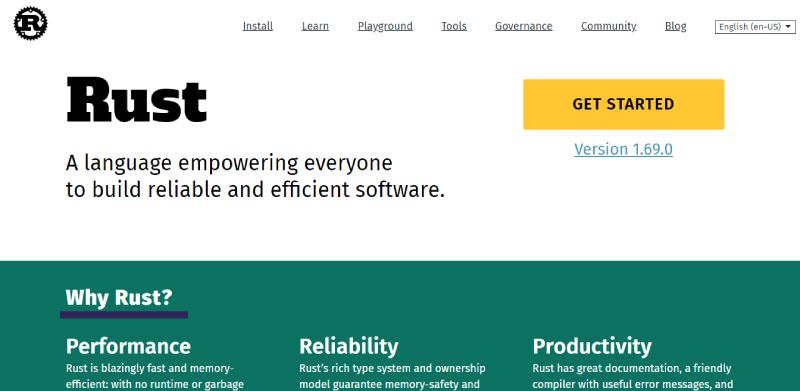
Think of Rust as the superhero that prevents the villains of memory leaks and security flaws. It’s built for safety without sacrificing speed, making it a rare breed in system programming. For those aiming for high-stakes performance, Rust is there, ensuring your structures stay solid.
Best Features:
- Memory safety without Garbage Collector (GC)
- Thread safety
- Performance
- Detailed documentation
What we like about it: Safety—but make it fast. Rust ensures that performance is not compromised in the name of avoiding crashes or bugs.
Kotlin
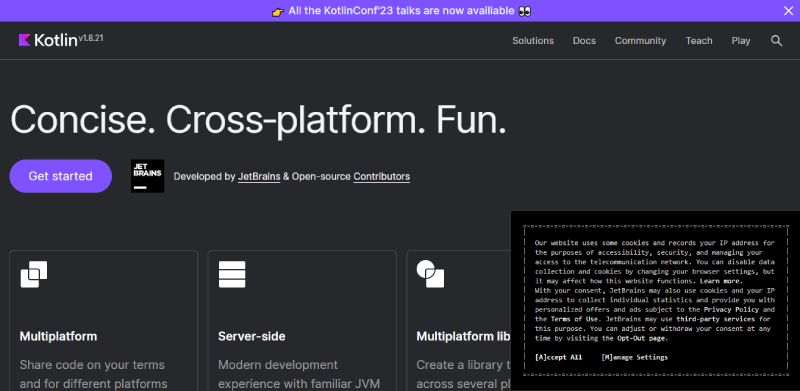
The new kid on the block that’s quickly become the cool kid—Kotlin. Rising to fame for Android development, its crisp syntax, and interoperability with Java have made it a darling for mobile and web developers alike. Kotlin’s like a breath of fresh air, breathing life into legacy code.
Best Features:
- Concise syntax
- Full Java compatibility
- Null safety
- Excellent for Android development
What we like about it: The fact that it plays nice with Java. Being able to work hand-in-hand with Java libraries and frameworks opens up endless possibilities.
Swift
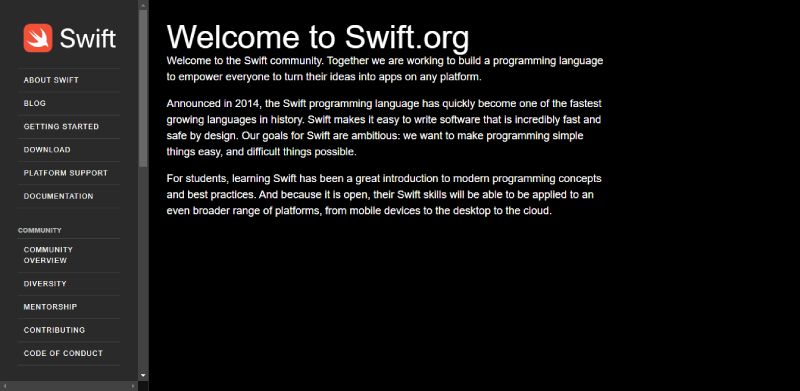 \
\
Swift soars above the rest when it comes to crafting beautiful, nifty iOS and macOS applications. It’s all about speed, efficiency, and safety – making sure your app not only looks good but also packs a punch under the hood.
Best Features:
- Fast and powerful
- Interoperable with Objective-C
- Open-source
- Safe by design
What we like about it: Its friendliness towards beginners. Swift eases you into the world of Apple development with supportive documentation and community.
Scala
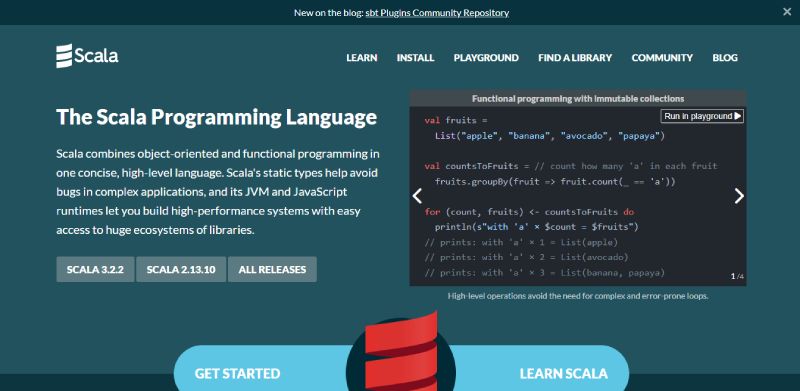
Enter the realm of scalable software with Scala. It’s like the magical hybrid beast of the coding kingdom, blending the best of functional and object-oriented programming. Companies with heavy data lifting turn to Scala for its robust performance and concise coding capabilities.
Best Features:
- Functional and object-oriented
- Scalable
- Interoperable with Java
- Concurrent programming
What we like about it: The scalability. Whether you’re a startup or a giant enterprise, Scala grows with your ambitions.
TypeScript
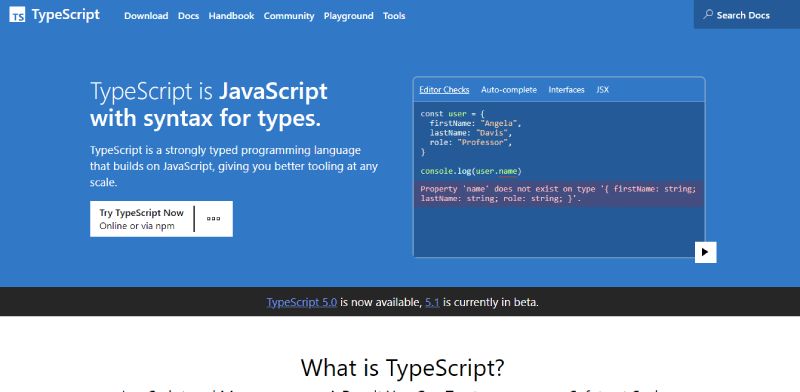
TypeScript is JavaScript’s protective older sibling, adding type discipline to help catch errors during development. It’s like having a safety net while performing a trapeze act — there’s rigour in the routine that lets you code confidently, knowing you won’t fall flat on runtime errors.
Best Features:
- Optional static typing
- Powerful developer tools
- Backed by Microsoft
- Superset of JavaScript
What we like about it: The enhanced productivity. TypeScript’s tooling and static analysis make for a streamlined development experience where bugs have a tough time hiding.
Clojure
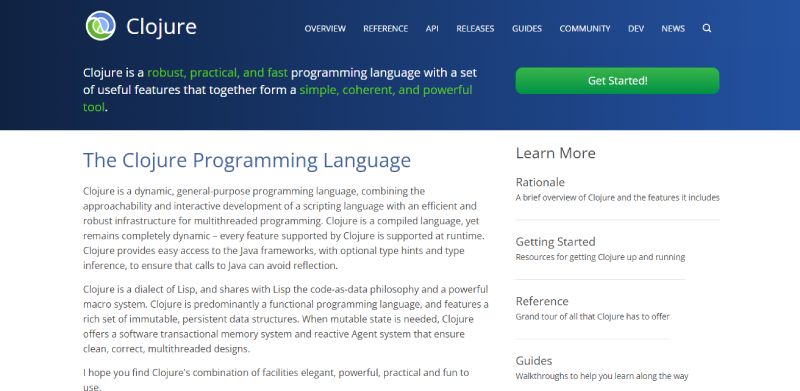
Enter the tranquil garden of Clojure, where functional programming meets practicality. It’s a haven for abstract thinkers who like their code as minimalist as a Japanese rock garden. Designed for concurrency and immutability, Clojure brings elegance to the back-end landscape.
Best Features:
- Functional programming
- Immutability
- Lisp dialect
- Code-as-data philosophy (homoiconicity)
What we like about it: The simplicity in managing state. In a mutable world, Clojure’s immutability is a clear stream of sanity.
Haskell
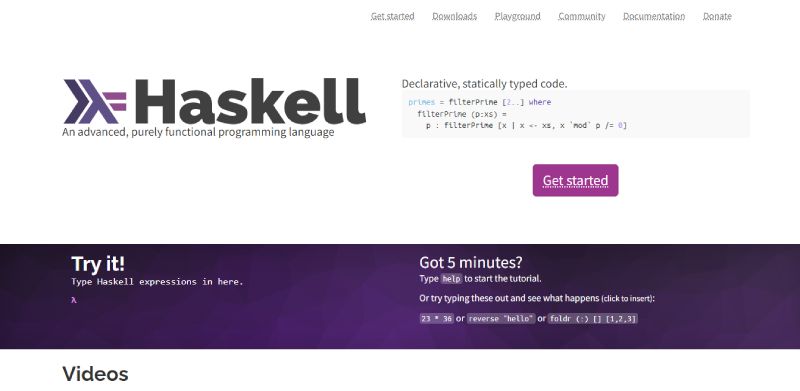
With a stern nod to mathematical precision, Haskell remains unflinching in its pure functional approach. Its strong type system and lazy evaluation make it a niche choice for complex problems, where correctness is the defining benchmark.
Best Features:
- Pure functional programming
- Strong static typing
- Lazy evaluation
- Emphasis on code correctness
What we like about it: The code it produces. Haskell scripts are like fine poetry – each line delivering exactly what it means to, no surprises.
Dart
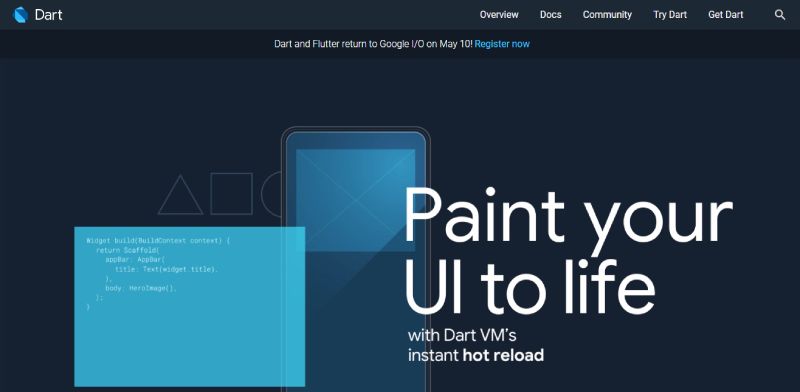
Dart is Google’s ace up the sleeve for app development, shining brightly with its Flutter framework that’s all about beautiful UIs. It’s aimed at crafting high-fidelity, natively compiled applications for mobile, web, and desktop from a single codebase.
Best Features:
- Flutter framework for UI
- Optimized for user interfaces
- Strong emphasis on end-user experience
- Single codebase for multiple platforms
What we like about it: The way it democratizes app development. Dart levels the playing field, enabling beautiful apps everywhere, from startups to big tech.
Crystal
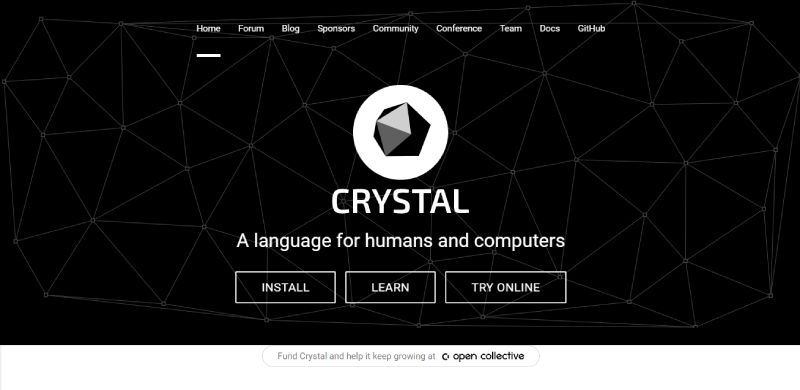
Crystal is like a secret potion – it has the beauty and ease of Ruby but aims to be as fast as C. This language is your under-the-radar pick for when performance needs to match the slickness of your code.
Best Features:
- Ruby-like syntax
- Compiled language (for performance)
- Null reference checks
- Concurrency support
What we like about it: Its balance of speed and developer joy. Crystal makes sure the fun isn’t left behind in the quest for efficiency.
Lua
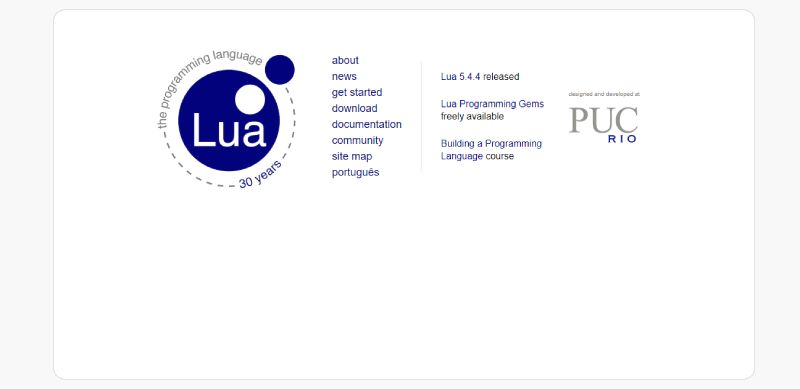
Lua is that lightweight, fast scripting language that feels like a brisk walk in the park. Common in game development and embedded systems, its speed and embeddability make it a delightful choice for extending applications.
Best Features:
- Lightweight and fast
- Embeddable
- Flexible (multi-paradigm)
- Powerful data description constructs
What we like about it: The smooth integration. Lua plays well with others, making it a breeze to embed within various host languages.
R

The stats whisperer, R, commands respect in data analysis and statistical computing landscapes. With an unrivaled package ecosystem for various data manipulation and visualization tasks, it’s the lens through which data becomes clear and actionable insights emerge.
Best Features:
- Comprehensive statistical analysis toolset
- Extensive package repositories
- Graphical capabilities
- Strong community for data science
What we like about it: The stronghold on all things data. When there’s data to dissect, R is your go-to surgeon.
Julia

Julia zips through the technical computing scene with a reputation for high-performance numerical computing. It’s the multilingual scholar of languages — comfortable with math-heavy tasks and scientific computing without breaking a sweat.
Best Features:
- High-performance JIT compilation
- Technical and numerical computing focus
- Multiple dispatch
- Easy to learn syntax
What we like about it: Its flair for number-crunching tasks. When performance and precision count, Julia is your sure bet.
Groovy
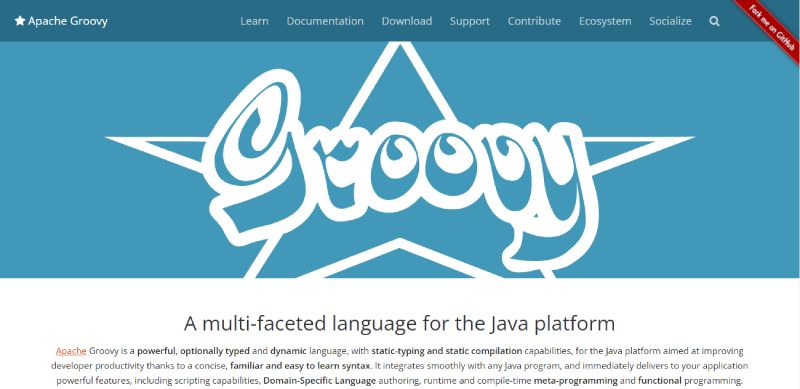
Dance to the beat of Groovy, the dynamic language for the Java platform that makes scripting smooth as silk. Designed to complement Java, it takes the edge off boilerplate code, bringing a more expressive and concise scripting environment to the JVM.
Best Features:
- Java platform integration
- Syntax simplicity and expressiveness
- Supports domain-specific languages (DSLs)
- Flexible runtime and compile-time metaprogramming
What we like about it: The agility it adds to the Java world. Groovy slips into JVM projects with grace, adding a playful touch to Java’s sternness.
Nim
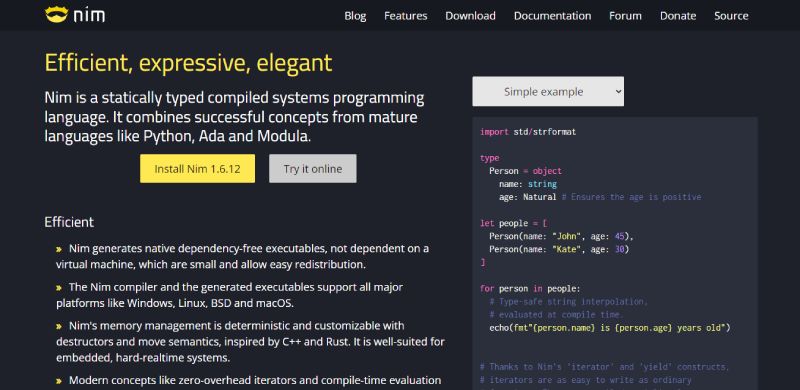
In the land of system programming, Nim stands out with its python-esque syntax and the ability to compile to C, C++, and JavaScript. It’s about writing algorithms that hum with performance while keeping the code readable and fun.
Best Features:
- Compile to C/C++ or JavaScript
- Readable syntax
- Memory efficiency
- Powerful metaprogramming
What we like about it: The element of surprise. Nim compiles down to the bare metal, yet reads like a story. It’s a quirky take on performance-focused languages.
FAQ on PHP alternatives
Why look for PHP alternatives in the first place?
PHP’s been a mainstay, sure. But sometimes, you hit a wall. Speed, simplicity, or the latest tech trend—there are reasons aplenty. You want a cutting-edge toolkit, and other languages might just offer that sharper edge. It’s all about the right fit for your project goals.
What makes Node.js a popular PHP alternative?
Node.js—talking about real-time applications, it’s a champ! Brings JavaScript server-side, meaning code reuse across client and server. Non-blocking I/O? Check. Lightweight for microservices? Double-check. It’s that lean machine you want when performance is top priority.
How does Python compare to PHP for web development?
Ah, Python—it’s the multi-tool in your development kit. Versatile, cleaner syntax, and great for rapid development. Plus, it’s a hit with data science, which PHP isn’t really cut out for. And with Django or Flask, you’re all set for a smooth ride from concept to launch.
Can Ruby on Rails be a good PHP alternative for startups?
Ruby on Rails brings its A-game with convention over configuration. Startups dig it for faster MVPs, thanks to gems (packages) and a supportive community. It’s like choosing the express lane when PHP feels like the regular queue.
Is Go (Golang) better than PHP for concurrency?
Yep, Go, or Golang, thrives on concurrency—goroutines are lightweight, and channels for communication are sleek. PHP’s effort in this arena with pthreads doesn’t quite match up. Go for Go when you’ve got concurrent tasks and performance speed in your sights.
What are the advantages of using ASP.NET over PHP?
ASP.NET—Microsoft’s baby—is all about seamless integration with Windows servers and other Microsoft products. Top-notch security and performance, especially for enterprise-level apps. And C#, beautiful for the object-oriented purists. PHP has its merits, but ASP.NET has that corporate sheen.
Do Java and PHP serve different purposes in web development?
Absolutely. Java is like the seasoned veteran, nailing large-scale, complex applications. It’s heavy-duty, with portability across various platforms. PHP’s more the quick and easy route for web-centric solutions. Distinct lanes, both powerful in their own rights.
How does Swift compare to PHP for server-side development?
Now, Swift might sound like Apple’s playground, but it’s breaking the mold with Vapor for server-side development. Brings that iOS-native feel to web apps. PHP hasn’t touched mobile, where Swift runs circles. That said, Swift for the backend is still budding.
Does using JavaScript frameworks offer benefits over PHP?
Imagine a Swiss Army knife—that’s JavaScript with its frameworks. React, Angular, Vue.js on the frontend, Node.js for the backend—you get a full stack solution. And MERN or MEAN stack is just nifty for single-language efficiency. PHP’s great, but JS is full-stack great.
Is using a content management system like WordPress considered a PHP alternative?
Here’s the twist—WordPress thrives on PHP. But look, considering a CMS might steer you away from coding in PHP directly. Headless CMS options allow for React or JavaScript frontends, so PHP’s under the hood, but you might not tinker with it much.
Ending thoughts
So, we’ve journeyed through the vibrant landscape of PHP alternatives, right? It’s kind of like opening a door to a room you never knew existed in your own home. Each alternative – be it the sleek Python, the rapid-firing Ruby on Rails, or the real-time champ Node.js – they’ve all got their jazz.
It boils down to this:
- You want more than just web pages; Python’s versatility has got your back.
- Hungry for speed in getting your idea live? Ruby on Rails won’t make you wait.
- And when talking about powering up chats or live updates, Node.js is your main mate.
Choose your player wisely. The right pick can make your web adventure smooth, fast, or even more creative. It’s all about finding that perfect match for your project’s vibe. The world’s moved past just one-size-fits-all solutions, and now, you’ve got the map to explore it all. Ready, set, code! 🚀
If you liked this article about PHP alternatives, you should check out this article about Angular alternatives.
There are also similar articles discussing Ruby alternatives, Redux alternatives, Express alternatives, and Spring alternatives.
And let’s not forget about articles on Flask alternatives, TypeScript alternatives, Laravel alternatives, and Python alternatives.
- Professional Video: Cinematography Apps Like FiLMiC Pro - April 26, 2024
- Optimizing Your Shopify Store for Maximum Dropshipping Success - April 26, 2024
- Python Explained: What is Python Used For? - April 26, 2024



